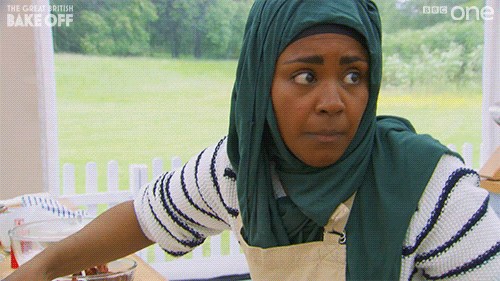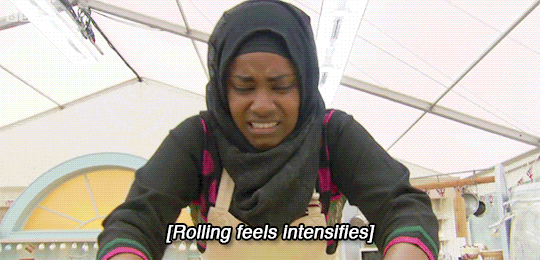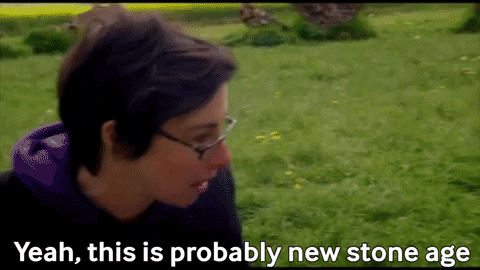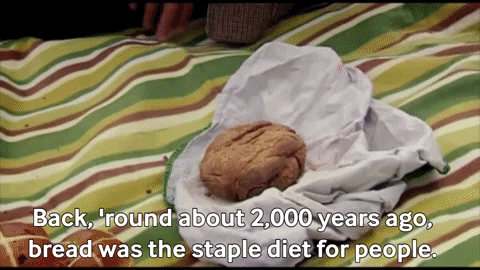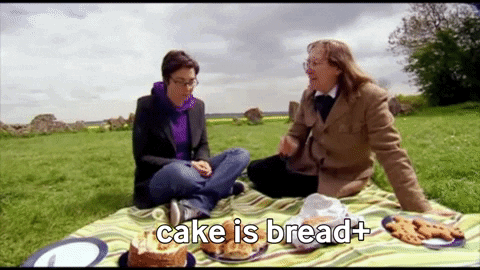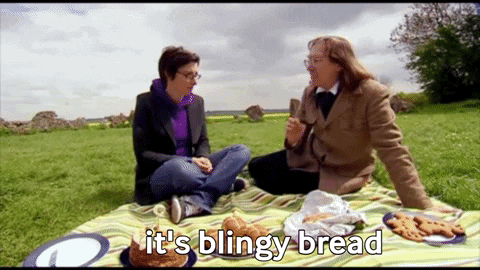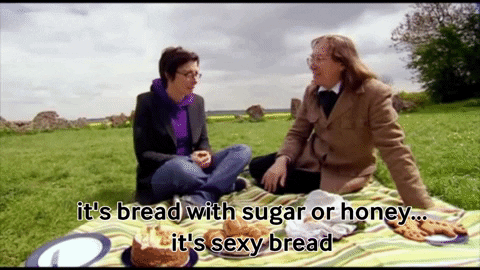Feeding the Civic Imagination (Part Three): The Great British Bake Off
/Lauren Levitt and Elaine Venter
Lauren:
Hi, Elaine. To start off, can you tell me a little bit about how you started watching The Great British Bake Off (GBBO), or The Great British Baking Show in the U.S.?
Elaine:
Hi Lauren. Excited to be working with you on this discussion.
I actually started watching GBBO on social media in 2015. I had made several friends from the UK on Tumblr through connected TV fandoms, and many of them were posting GIF sets and clips of the show. In particular, my attention was really captured by a post consisting of a set of three GIFs showing a baker making the most amusing facial expressions as she questions whether her royal icing tastes like bubblegum.
Once I was able to get my hands on the full episode, which was not yet airing in the US (and we’ll leave it at that!), I became a fan, and quickly caught up to previous seasons (or series in UK), which does include the first two series that did not air in the US at all.
The music, the charming and pun-tastic hosts, Mel and Sue, baking queen Mary Berry as a judge with celebrity chef Paul Hollywood, the almost too polite and amateur bakers that seemed so relatable, the lack of overproduced drama and cutthroat competition I had come to associate with American baking shows, and, of course, the bakes—all had me hooked! That started my obsession with GBBO.
Lauren:
I started watching GBBO after it was recommended to me by my close friend and fellow scholar Ayanna Dozier, who said that she watched the entire thing, even though it wasn’t the sort of show she is usually into, because the production values were so high. I was immediately hooked because of how soothing the program is. It was the perfect program to help me relax while I was staying home during the early stages of the COVID-19 pandemic, and I had soon watched every season on Netflix!
Elaine:
I am curious whether you not only picked up watching GBBO during the pandemic, but also baking like so many others as well? Or was baking something you were already doing?
Lauren:
It’s funny you should ask that. Baking is something that I have enjoyed doing since I was in college. There is something about it that is very relaxing to me. As long as you follow the directions exactly, everything should turn out correctly, at least theoretically! Perhaps this is one of the reasons I found GBBO so soothing. However, I try to avoid gluten and sugar for health reasons, so I no longer do a lot of baking at home. I did make sweets for some of my partners over the pandemic, including a pineapple upside down cake which was definitely GBBO influenced.
Over the pandemic I had more time to focus on my physical and mental health, though. To a great extent, this meant working less, but I also started exercising and cooking more. Whereas before I was eating a lot of salads and prepared foods, during the pandemic I tried to make at least one homemade meal a week for myself.
Elaine:
I bought Val Stone’s first cookbook, which she self-published with a lot of fan fundraising, and baked a few of her bakes there. It’s amazing to see how the show itself has increased representation and awareness of other kinds of baking, including gluten-free, dairy-free, and even keto at one point!
However, like you, I did bake before too. Although, while I did grow up in a baking household, that doesn’t mean I was very good at it! I completely understand what you mean about steps, but for some reason if my mother isn’t with me, my bakes never come out just like hers or quite right.
Lauren:
I too was impressed by the amount of gluten-free baking on the show, which is clearly of interest to me.
Can you tell me about your academic interest in GBBO?
Elaine:
My academic pursuits revolved around my frustration at lack of timely access when I was connected with fans in the UK through social media, that influenced me to pursue a deeper, more thorough investigation on geoblocking, the blocking of access to media content online based on geographic location. While the show did air in the US, I got into it during a season that was not yet airing here, and would not for several months, compared to the now only three day wait between UK Channel 4 and Netflix US air dates. The delay window affected the seasons available to US fans let alone PBS only picking up the show at its actual third series, leaving the real first and second only having aired in the UK.
The entire situation seemed rather paradoxical to me with general wide openness of social media connections, but the closed digital portals of media content from official sources. Since middle school, I learned about globalization from many American teachers who talked about the wonders of globalization and the increased connection of shared languages, cultures, economies, and technologies, especially in the modern era of digital networks afforded to us by the Internet.
Worse, the official GBBO social media channels were and still are open to any who follow them and episodes were added to BBC’s iPlayer, now Channel 4’s website, but the channels are based on UK air dates and streaming is restricted due to copyright, which is fair. After all, the show was designed by and for British audiences. Who knew the show, and, in addition, British baking, would end up becoming such a global phenomenon?
Large online fandom communities have amassed because of GBBO, but they are there for more than just commenting on their favorite bakers or moments. Many fans are even baking along with the show, sharing recipes with one another, some learning to bake for the first time while others learning to hone years of home baking. They are learning about one another through shared bakes. Aura Sampson started her own bake-along Facebook group for US fans in September 2019 and now operates her own baking blog, Little House Big Alaska, where she “is on a mission to teach modern family oriented women how to make old-fashioned foods new again.” Her Facebook group has over 9,500 members. Groups go beyond bake-alongs and share bakes part of their cultures, religions, etc. This is one of MANY groups out there.
For me, access to the show became about more than just accessing a piece of media that I felt was calming, but about accessing media that was fostering shared learning and community that while centered around food is about so much more than just food.
For example, between series 1 and 5 (in US, series 3 would be our season 1), GBBO featured historical segments on bakes from the theme of the episode (biscuit week, bread week, etc.), and would typically add to the technical or showstopper themed bakes. These segments included historical context and analysis from food historians and other professors and were educational moments that gave a deeper appreciation of food, but also an understanding of what shaped these foods, which in turn have shaped our societies, and shaped us. These educational segments reveal the sociopolitical and cultural connections to the production, distribution, and consumption of food, and the people who make and consume the food. These segments inspired an interest in further researching these connections, launching several discussions with friends and even complete strangers online about cultural practices centralizing around food, leading to insights on politics of a place and time.
I wonder, Lauren, in your own watching of the show in its later seasons, what are your observations on the historical and socio-political contextualization of the bakes?
Lauren:
I remember the show having some historical segments, and I definitely watched the ones about Cambridge pudding and about the stroopwafel. However, I don’t remember these segments being very common. I think this might be related to what you were just saying about differential access in different countries. As I mentioned previously, I watched GBBO on U.S. Netflix, and not all the seasons are available there.
Elaine:
I remember the stroopwafel segment and that interesting and surprising divide in the fandom, as alluded to in the stroopwafel story. What did you make of some fans who seemed quite annoyed about food history being employed in a show? Do you think this shows a difference in those fans who watched the show on BBC One versus when the show moved to commercialized Channel 4? The show’s run time has been cut ever since it moved to Channel 4 and includes advertisements now.
Lauren:
To be honest, I did not realize that the return of the historical segment had been controversial until I was looking for a clip to include in this conversation. Unlike you, I watched the show very much in isolation from fan communities. I did know that the show moved to Channel 4 after it was canceled by the BBC, but since I watched the series on Netflix, I did not notice the addition of advertisements. I do, however, recall some discussion online about why the BBC canceled GBBO despite its immense popularity, with some commentators plausibly claiming that this has to do with a devaluation of feminine interests such as baking.
Elaine:
You mention a fascinating point on its move from BBC to Channel 4. I was wondering if you can expand on that and why you think that might have been the case?
I find it especially intriguing as my research indicates Love Productions was more interested in more money and advertising once the license for GBBO went up for bid again as a key reason BBC lost GBBO.
The show had become increasingly popular with a key demographic, millennials (I will admit to not having checked statistics on gender, however). As David Sillito writes in their 2016 BBC article, “Who would have dared say 10 years ago that the way to reach ‘Millennials’ was baking?” Many have argued that the show has been responsible for a baking revolution not only in the UK, but in several countries, including the US.
Looking to take advantage of that growing millennial market, Channel 4 was jumping at the chance to buy up the GBBO license from Love Productions once the license was up for sale again. BBC offered £15 million to renew their license, but Channel 4 offered over £10 million more. Love Productions decided to move the show to Channel 4, offering them even more opportunities in advertising, which Love Productions could not get while their show was airing on BBC. Netflix only bought the online streaming license to air GBBO in certain markets, including the US.
Many doubted the show would succeed after its move, especially after original hosts, Mel and Sue, and judge Mary Berry left with BBC’s loss of the license, but over 6 years later, the show seems to still be going quite strong.
Lauren:
As you mentioned, GBBO moved to Channel 4 because the BBC would not pay what Love Productions asked for, even though it was Britain’s most watched show. The BBC will typically only pay £300,000 for factual programming like GBBO, but they offered Love Productions £15 million for 30 hours of programming, which was £10 million less than what they wanted. However, in 2015 the BBC had agreed to pay £60 million a year to keep the Premier League’s Match of the Day. Some fans understandably speculated that the BBC’s emphasis on sports, especially football (soccer in the U.S.), is because watching sports is a conventionally masculine pastime.
Elaine:
Certainly, more conventionally masculine, indeed, and I can see the argument of BBC prioritizing the masculine-orientated sports show over baking, a conventionally female pastime. GBBO was only on the air for 6 years at that point compared to Match of the Day (MOTD), which had been a staple of BBC programming since the 1960s.
Taking into consideration that a lot has changed since 2016, this has inspired me to check on more current data between the two, if you’ll indulge me.
Despite a rocky start, Channel 4 ratings for GBBO continue to grow with finales, especially continuing to break Channel 4 records, while ratings for Match of the Day (MOTD) seem to be dropping to the point that some wonder if this isn’t the death of the sports clip show itself.
The ratings data tables from Equity Release Supermarket visually represents how while MOTD may have seemed more of a sure bet with its seemingly similar and higher ratings than GBBO for years, GBBO continues to grow on Channel 4. One can argue the high ratings in 2016 was in part that it was the last finale on BBC before the show shifted to Channel 4 and there was more fanfare. However, GBBO started quite strong on Channel 4, and despite a dip in 2018, continues to grow in ratings and overall beats out MOTD in viewership. Even with the dips seen in 2021 viewing across the board as viewers return to work, GBBO is still projected to grow. However, Equity Release questions whether the ratings drop from 2020 for MOTD are because of the effects of Covid on live sporting events, the lifeblood of MOTD, or if we can expect declined viewership in its future.
And, according to YouGov data, GBBO ranks as 24th in their “The Most Popular Contemporary Tv Programmes (Q1 2022)” list, whereas MOTD ranks 79th. Their data shows GBBO is popular with 66% of women vs 38% of men, while MOTD ranks popular with 50% men and 30% women. However, the age range distinction is interesting between the two as well with GBBO popular with 55% of Millennials, 51% of Gen X, and 51% of Baby Boomers, but MOTD ranks popular with only 43% millennials, 39% of Gen X, and 41% of Baby Boomers.
I wonder if the BBC isn’t perhaps regretting their decision now in not putting more trust in a baking show to not only compete, but eventually out rate one of the longest running sports clip shows, not putting more trust in its audience, especially its female audience.
Lauren:
That’s a good question.
On a different note, can you tell me more about your personal relationship to GBBO?
Elaine:
Personally, GBBO helped me consider the much deeper implications of sociocultural politics that shaped the foods I enjoy, the complex and even controversial origins of how certain influences shaped the foods I took for granted, the culture I identify as (South African American), and even the relationships between myself and others. I believe this is just one of the reasons this show is resonating with so many viewers, not only increasingly in the UK to the point it’s beating out the likes of MOTD now, but across the globe.
Beyond being a comforting show about baking, it inspired me to research the origins of the South African foods I grew up with and took for granted. A former Commonwealth country, South Africa has a history of colonialism from several countries, dominant forces including the Dutch and the British, and slavery that definitely had an effect on the foods that shape the country to this day. The Dutch colonists imported slaves to the Cape from many regions, including from their conquests in India, Malaysia, Indonesia, and more. Through watching the show and participating in the fandom, I gained a much deeper understanding of the complex history involving the popular and culturally significant and unique Cape Malay Curry, for example. A dish my mother ate while pregnant with me, which she attests must be why I love curries so much.
Lauren:
There are a couple of points you have raised over the course of the conversation that I would like to pick up on. First, I too noticed the lack of competition and frequent cooperation among bakers on GBBO, despite the competitive game doc format. I have previously written about the similarities and differences between documentary and reality TV, specifically Paris Is Burning and RuPaul’s Drag Race, and I found that RuPaul’s Drag Race is able to address serious socio-political issues despite its competitive game doc format.
The lack of competition on GBBO is in direct contrast to other American cooking shows from around the same time such as Cutthroat Kitchen, which highlighted competition and agonism. It seemed that the lack of competition on GBBO, combined with elements of mise-en-scene such as the pastel sets and transition shots of animals in the English countryside, were an explicit attempt to represent a quintessentially British politeness. It was interesting to me that the show was branding British identity in this way for both national and global audiences, despite the rise of democratic backsliding in the UK linked to far-right, xenophobic, nationalist politics as exemplified by Great Britain’s exit from the European Union.
On a related note, you also mentioned both globalization and colonialism. Another aspect of GBBO that struck me was the way that it was cast to represent the diversity of multicultural Britain. This included contestants from former British colonies, as well as other immigrants to the United Kingdom. The show was also cast to include contestants from a variety of different British regions in each season. Contestants’ recipes often reflected their ethnic and or regional background. Again, this contrasts with the current backlash against multiculturalism and immigration in the UK as apparent in Brexit.
Elaine:
I will have to read your previous work on documentary and reality TV.
I think your response on the show’s representation of the quintessentially British politeness in juxtaposition to the reality outside the show of the democratic backsliding and events that led to Brexit very important and poignant.
It also brings up important questions about identity:
1) What does it mean to be British?
2) What is British food?
3) Who gets to decide?
My research on GBBO’s popularity, especially from 2019 and 2020 – the timeline roughly underscoring increased political upheaval in UK and US and the pandemic – brings up several articles making reference to the show being a safe haven from politics. One GBBO Facebook group I am a part of strictly prohibits the discussion of politics as part of membership even.
However, online, many of the bakers have been the victims of tremendous online bullying, some of it quite political. Series 6 (that’s season 3 in US) winner, Nadiya Hussain, a first-generation British Bangladeshi and Muslim woman, was told to “go home” while she was competing on the show on Twitter, and the target of terrible racist abuse online when she used apple in a Cornish pastry recipe in her own show Nadiya’s British Food Adventure. Hussain has defended herself on social media against several trolls:
Lauren:
It’s interesting that the show has been framed as “a safe haven from politics,” since apoliticism implicitly supports the status quo. I would say that the show is more an expression of cosmopolitan tolerance
Elaine:
Connected to the above on immigrants and cultural recipes and bakes on GBBO and on global appeal of the show, we’ve seen American bakes make their way into the tent. There have been bakes featuring peanut butter as flavor, brownies, chewie and soft cookies, and donuts. Yes, while some of these do not originate in America, they have become quintessentially American, and, yet not one American calling Britain home yet has been on GBBO. We’ve even seen American celebrities on the charity version, The Great Celebrity Bake Off for SU2C (Stand Up 2 Cancer), but no American expats in Britain on GBBO itself. Do you think GBBO may ever feature an American contestant?
Lauren:
I can’t say for sure, but if I am correct that the show is trying to evoke a quintessential Britishness, then it is unlikely that there will be an American expat on the show anytime soon. The US population in the UK is fairly low because of prohibitive bilateral immigration restrictions between the two countries. You basically have to be a key skills worker to get a work visa in either country as a citizen of the other.
Elaine:
Well, Lauren, a most insightful discussion on GBBO. I have enjoyed digging deeper into the show from both our personal and academic interests, the way the show has not only entertained but how it connects fans in communities learning about baking and even different cultures, motivations leading to GBBO’s move from BBC to Channel 4, and the representation of a quintessential Britishness.
Looking forward to seeing what changes the next series brings us. Happy baking.
Lauren Levitt is a postdoctoral fellow in Communication at Tulane University, where she is working on a collaborative research project about the impact of COVID-19 on creative industries in New Orleans and Tel Aviv. She is also working on a book project about sex workers’ networks of care.
Elaine Venter is an assistant professor of mass communication at Colorado Mesa University teaching a wide variety of classes including introduction to media, social media, design for mass comm, and advanced media theory. Her research interests are focused on media access, media industries, the internet, video games and esports, and representation in media. She is a mediocre baker and esports gamer.


